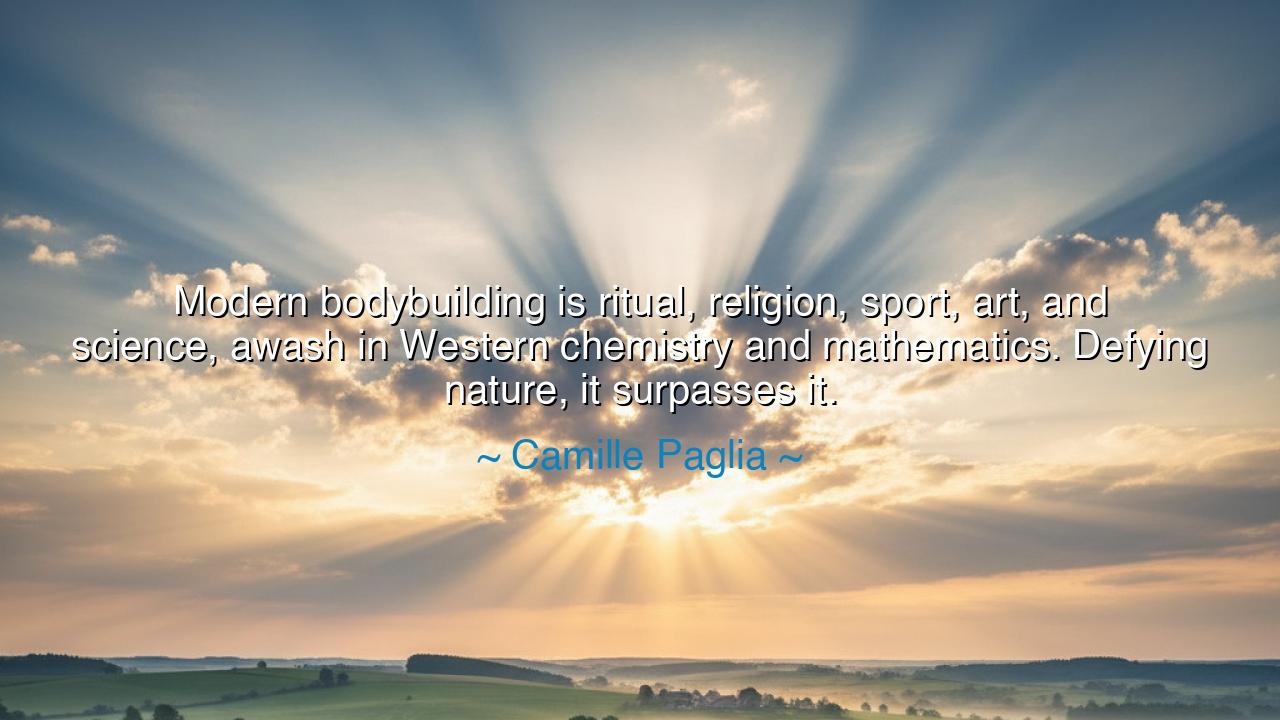
Modern bodybuilding is ritual, religion, sport, art, and science
Modern bodybuilding is ritual, religion, sport, art, and science, awash in Western chemistry and mathematics. Defying nature, it surpasses it.






"Modern bodybuilding is ritual, religion, sport, art, and science, awash in Western chemistry and mathematics. Defying nature, it surpasses it." These words, spoken by the insightful Camille Paglia, invoke a powerful image of the modern world’s obsession with the body—its strength, its shape, and its potential. Bodybuilding, she argues, is no mere physical pursuit; it is a sacred ritual, a religion for those who devote themselves to the ideal form. In this practice, the human body is worshipped, sculpted, and transformed, using not only physical discipline but also the advanced tools of science and chemistry. Paglia suggests that bodybuilding is an art form that transcends the natural human condition, becoming something more than the body itself—a realm where human will and modern technology merge.
In the ancient world, the body was also revered, though not in the same way. The Greeks, with their reverence for physical perfection, elevated the human form to an almost divine status. Athletes competed in the Olympic Games, not only as a display of strength but as an offering to the gods. The statues of gods like Zeus and Apollo were not mere representations but ideals of the perfect human form. The Greeks believed in the balance of mind, body, and spirit, and in their view, physical perfection was a reflection of one's moral and intellectual pursuits. However, unlike modern bodybuilding, which is driven by modern science and chemistry, the Greeks saw the ideal body as the product of natural harmony and personal discipline.
Yet, as Paglia notes, today’s bodybuilding goes far beyond the ancient ideal. Modern bodybuilders use Western chemistry—hormones, steroids, and supplements—alongside rigorous training regimens to push the human form to its limits. The pursuit of the muscular physique is no longer an expression of natural beauty or symmetry; it is a scientific experiment in which the human body is molded like clay, sometimes defying the very laws of nature. Chemistry and mathematics come into play, as the calculation of diet, training schedules, and supplementation has become as meticulous as any scientific formula. Paglia’s statement is a reflection of this transformation—bodybuilding today is both a ritual and a science, where athletes worship the process of transformation itself.
Consider the example of Arnold Schwarzenegger, the legendary bodybuilder who transformed not only his body but his entire life. Arnold’s dedication to the art of bodybuilding was unparalleled, and his success was as much about his mental discipline as his physical prowess. But it wasn’t just his training and determination that set him apart; it was his willingness to embrace the use of modern science and chemistry. Through the use of performance-enhancing drugs and precise nutrition, Arnold’s body transcended what was thought possible. His muscles became a testament not just to human strength, but to human ingenuity. His success, like that of many modern bodybuilders, highlights the merging of art and science, and how the body is no longer seen as a mere vessel but as a canvas for human will and innovation.
The ancient warrior kings understood the importance of the body as a tool of power and influence. Alexander the Great, known for his physical stamina as much as his strategic mind, was said to have been in peak physical form, using his body as a symbol of strength and leadership. However, unlike the modern bodybuilder, Alexander’s strength was honed through the natural means of combat and training, not through chemical enhancement. His image as a conqueror was one built on the ideal of human endurance, unassisted by modern science. Yet, his story reflects the same drive for physical excellence that is central to bodybuilding today: the body as a representation of the will and ambition of the individual.
In the modern era, the question arises: Is this new bodybuilding an enhancement of the human spirit, or does it lead to a separation from our natural origins? Is the use of modern chemistry and science a way of reaching beyond nature to achieve the perfect form, or does it obscure the true beauty of the human body in its natural state? Paglia’s words challenge us to reflect on whether bodybuilding, as it exists today, is a form of art, a form of worship, or simply the overreach of human ambition.
The lesson here is one of balance. While there is much to be admired in the dedication, science, and art of bodybuilding, we must not forget that the pursuit of perfection should not come at the expense of our humanity. True strength lies not only in muscle and might, but in understanding the delicate relationship between the body, the mind, and nature. As we strive to transcend our limitations, we must remember that the greatest achievements are those that honor the natural harmony of all things. Let us build not only our bodies, but also our minds, ensuring that we do so in ways that uplift, rather than distort, the essence of human nature.






AAdministratorAdministrator
Welcome, honored guests. Please leave a comment, we will respond soon